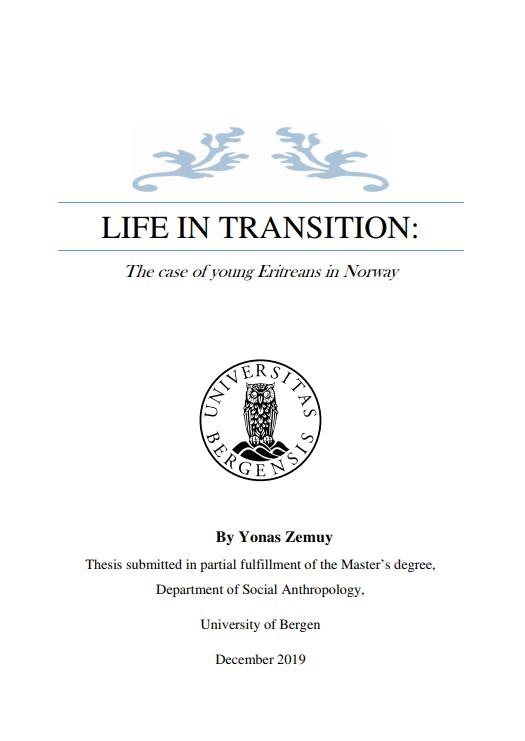Life in transition: the case of young Eritreans in Norway
Hovedinnhold
Master's thesis submitted at Department of Social Anthropology, autumn 2019.
By: Yonas Zemuy
Supervisor: Professor Leif Manger
In the context of contemporary population mobility, the topics of migration, immigration, refugee resettlement have become the focus of studies in several disciplines including political sciences, sociology, anthropology but to name a few. It is a subject, which involves and fascinates both the scholarly world and the public sphere equally. It is an area of study, which by its nature has been and continues to be politicized, thus engaging both the policy makers and the public in equal measures. However, the study of youth in the paradigms of migration have not gained the necessary attention. Youth are often overlooked or a little is studied of them, and when studied the attention is usually on their psychological wellbeing or their educational success. Their socio-cultural adaptation process and their inclusion to the new society are most of the time overlooked.
The purpose of the thesis is therefore to shade light onto this process. The thesis draws upon a yearlong fieldwork among a group of young Eritreans who came to Norway as unaccompanied minors. The thesis discusses their unique experiences in light of two broad anthropological concepts i.e. Human mobility and youth studies. From a transnational perspective, the thesis discusses the involvement of the youngsters with in the Eritrean diaspora. Taking a supposedly religious event as a case study, it examines their daily interactions with their neighboring Eritreans. Moreover, their social connections with their families and childhood friends are also examined. Facebook is a popular social media among the youth, which is used to maintain close relationships with family members in Eritrea and their childhood friends around the globe. My fieldwork also included following the youngsters’ online activities on two social media, Facebook and Snapchat. Their online activities, which by the way continues also on the real (offline) world, indicates their attempt to establish and maintain new social bonds with their mainstream peers, which is presented via detailed discussions of their posts and meanings behind them. Towards the end of the thesis, I further examine their involvement with their mainstream peers by studying their newly established friendship. I discuss how their love and participation in football and football related activities has helped the youngsters to foster a symbiotic friendship that goes beyond football arenas. The nature and utilization of this kind of friendship are thoroughly discussed. Their online as well as offline interactions imply that these youngsters are negotiating daily their existence in two worlds their original homes and their new cultural surroundings.
Keywords: Migration, Transnationalism, Youth Studies, Social Capital, Social Identity, Eritrean Youth, Friendships, Adaptation.
